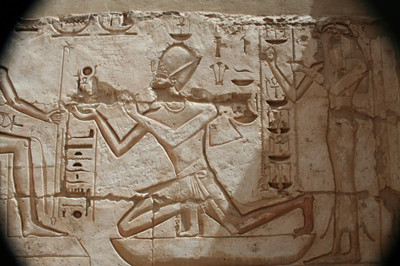And so warfare plays really a key role in, if you like, the consolidation of the Egyptian sense of their own nationhood.
因为我们可以说,战争是真的扮演了关键的作用,帮助埃及人进一步巩固自我的建国意识。
It's a discouragingly familiar strategy. You win hearts and minds at home by focusing on the threats from abroad, but the weapons that you need to crush the enemy can come in handy when you're dealing with domestic opponents as well. The political rhetoric of foreign aggression is backed up by very brisk policing at home.
这是一种令人沮丧的熟悉伎俩。当把所有注意力集中到对抗外敌上,你能够赢取国内的民心;然而在需要的场合上,用来粉碎敌人的武器也可以直接施用于自己国内的有反抗情绪的老百姓身上。对外侵略的政治修辞总有相当犀利的国内政策来支持。
The apparatus of the modern state had been forged. And the enduring consequences were artistic as well as political. Only power of this order could organise the enormous building projects that these early pharaohs embarked on.
现代国家这种机器建造起来了,产生了艺术上与政治上的持久性后果。也只有这种秩序的力量,能组织起人力建设起这些早期法老下令开工的那些伟大建设工程。
Den's elaborate tomb with granite shipped from hundreds of miles away, and the later, even grander pyramids, were possible only because of the extraordinary power the Egyptian pharaohs could exercise over the minds and the bodies of their subjects.
国王丹那宏伟的坟墓上的共岗岩,都来自于数百英里外的地区。后来的金字塔墓更加是气势恢弘。这一切,都是因为埃及法老在埃及民众心目中,拥有可以操纵他们身心、超同寻常的力量。
In the next programme, I'll be looking further east, beyond Sinai to Mesopotamia-modern-day Iraq. Two rivers there, not one, and not one great unitary state like Egypt, but competing groups of rich city states. But the same problems confront the rulers: how do you control these large, prosperous-but always turbulent-populations? And in part at least, they came up with the same answer: force.
在下期的节目中,我去探索更加东方的地方,跨过西奈半岛,到达美索不迷米亚——现代的伊拉克。那里流淌着不止一条,而是两条河流,那里也没有一个如同埃及一样伟大的统一中央王国,而且是散布着彼此竞争的富裕城市国家。然而所有的统治者都面临着同样的问题:究竟应该如何控制好这些人口众多而繁荣,共同又动荡不安的民族?至少从某方面而言,他们也采同了相同的措施:权力。













